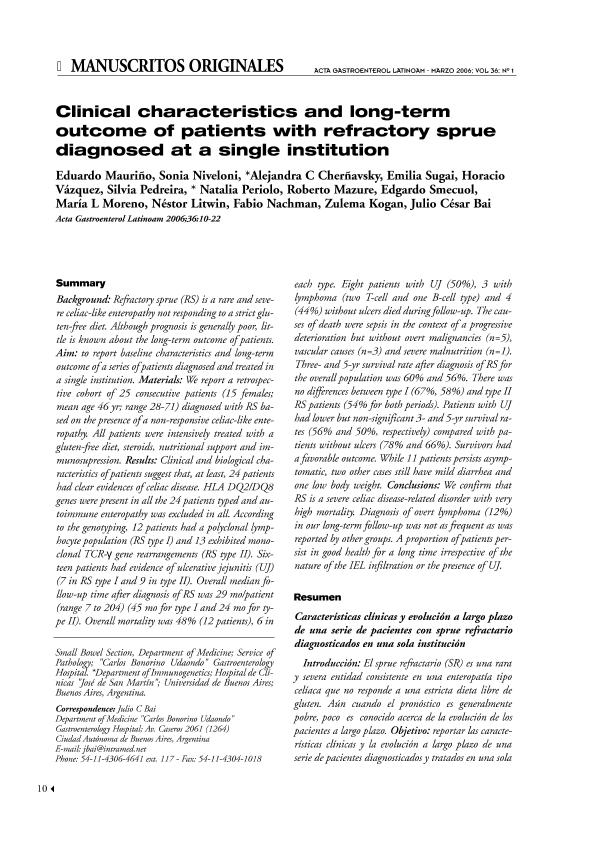Artículo
Clinical characteristics and long-term evolution of patients with refractory sprue diagnosed in a single institution
Título:
Características clínicas y evolución a largo plazo de una serie de pacientes con sprue refractario diagnosticados en una sola institución
Mauriño, Eduardo; Niveloni, Sonia Isabel; Cherñavsky, Alejandra Claudia ; Sugai, Emilia; Vázquez, Horacio; Pedreira, Silvia; Periolo, Natalia
; Sugai, Emilia; Vázquez, Horacio; Pedreira, Silvia; Periolo, Natalia ; Mazure, Roberto; Smecuol, Edgardo; Moreno, Maria L.; Litwin, Néstor; Nachman, Fabio; Kogan, Zulema; Bai, Julio C.
; Mazure, Roberto; Smecuol, Edgardo; Moreno, Maria L.; Litwin, Néstor; Nachman, Fabio; Kogan, Zulema; Bai, Julio C.
 ; Sugai, Emilia; Vázquez, Horacio; Pedreira, Silvia; Periolo, Natalia
; Sugai, Emilia; Vázquez, Horacio; Pedreira, Silvia; Periolo, Natalia ; Mazure, Roberto; Smecuol, Edgardo; Moreno, Maria L.; Litwin, Néstor; Nachman, Fabio; Kogan, Zulema; Bai, Julio C.
; Mazure, Roberto; Smecuol, Edgardo; Moreno, Maria L.; Litwin, Néstor; Nachman, Fabio; Kogan, Zulema; Bai, Julio C.
Fecha de publicación:
03/2006
Editorial:
Sociedad Argentina de Gastroenterología
Revista:
Acta Gastroenterologica Latinoamericana
ISSN:
0300-9033
Idioma:
Inglés
Tipo de recurso:
Artículo publicado
Clasificación temática:
Resumen
Background: Refractory sprue (RS) is a rare and severe celiac-like enteropathy not responding to a strict gluten-free diet. Although prognosis is generally poor, little is known about the long-term outcome of patients. Aim: to report baseline characteristics and long-term outcome of a series of patients diagnosed and treated in a single institution. Materials: We report a retrospective cohort of 25 consecutive patients (15 females; mean age 46 yr; range 28-71) diagnosed with RS based on the presence of a non-responsive celiac-like enteropathy. All patients were intensively treated with a gluten-free diet, steroids, nutritional support and immunosupression. Results: Clinical and biological characteristics of patients suggest that, at least, 24 patients had clear evidences of celiac disease. HLA DQ2/DQ8 genes were present in all the 24 patients typed and autoimmune enteropathy was excluded in all. According to the genotyping, 12 patients had a polyclonal lymphocyte population (RS type I) and 13 exhibited monoclonal TCR-γ gene rearrangements (RS type II). Sixteen patients had evidence of ulcerative jejunitis (UJ) (7 in RS type I and 9 in type II). Overall median follow-up time after diagnosis of RS was 29 mo/patient (range 7 to 204) (45 mo for type I and 24 mo for type II). Overall mortality was 48% (12 patients), 6 in each type. Eight patients with UJ (50%), 3 with lymphoma (two T-cell and one B-cell type) and 4 (44%) without ulcers died during follow-up. The causes of death were sepsis in the context of a progressive deterioration but without overt malignancies (n=5), vascular causes (n=3) and severe malnutrition (n=1). Three- and 5-yr survival rate after diagnosis of RS for the overall population was 60% and 56%. There was no differences between type I (67%, 58%) and type II RS patients (54% for both periods). Patients with UJ had lower but non-significant 3- and 5-yr survival rates (56% and 50%, respectively) compared with patients without ulcers (78% and 66%). Survivors had a favorable outcome. While 11 patients persists asymptomatic, two other cases still have mild diarrhea and one low body weight. Conclusions: We confirm that RS is a severe celiac disease-related disorder with very high mortality. Diagnosis of overt lymphoma (12%) in our long-term follow-up was not as frequent as was reported by other groups. A proportion of patients persist in good health for a long time irrespective of the nature of the IEL infiltration or the presence of UJ.
Archivos asociados
Licencia
Identificadores
Colecciones
Articulos(INIGEM)
Articulos de INSTITUTO DE INMUNOLOGIA, GENETICA Y METABOLISMO
Articulos de INSTITUTO DE INMUNOLOGIA, GENETICA Y METABOLISMO
Citación
Mauriño, Eduardo; Niveloni, Sonia Isabel; Cherñavsky, Alejandra Claudia; Sugai, Emilia; Vázquez, Horacio; et al.; Clinical characteristics and long-term evolution of patients with refractory sprue diagnosed in a single institution; Sociedad Argentina de Gastroenterología; Acta Gastroenterologica Latinoamericana; 36; 1; 3-2006; 10-22
Compartir



